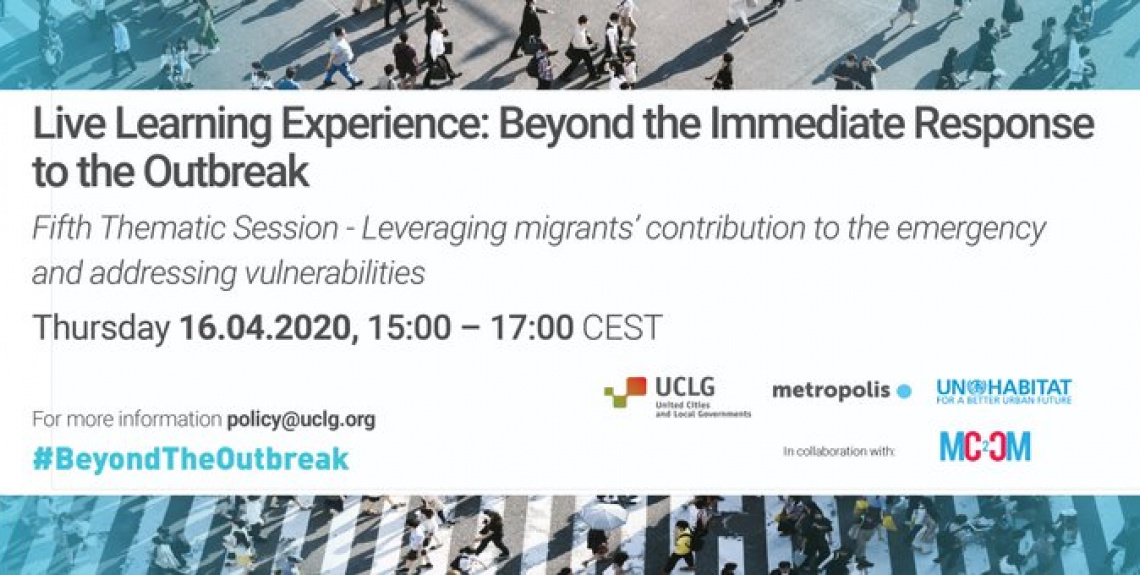Protecting migrants is a key issue raised by local authorities in the context of the pandemic. This includes finding ways to adapt communication on public health measures, ensuring access to right to health and food, coordinating actions with local associations and raise awareness on the urgency of the situation at different spheres of government. One of the last Learning Experiences organized by UCLG and the MC2CM project addressed many of these issues, highlighting the answers and difficulties experienced by local governments on this matter as well as the emergence of unprecedented logics of solidarity.
The Learning Experience on migration counted with the participation of several members of the MC2CM project and the UCLG-CSIPDHR such as Sfax or Sousse (Tunisia), as well as of local governments also committed to the local defense of human rights, such as Grenoble (France), Lampedusa (Italy) or Quito (Ecuador). The sharing the policies and initiatives put in place by local governments in this regard allowed to identify various entry points by which cities and regions are developing sound responses to the needs of migrants in the context of the pandemic: How to protect migrant residents in vulnerable situations, relating to health, food, housing or work, often linked to the issue of informality?
The city of Sfax shared during the sessions its cooperation experience with local associations and international partners to provide migrants with food baskets, solidarity funds or opening access to public healthcare for migrants. The cities of Grenoble, Al Hoceima and Rabat have found ways to provide emergency accommodation to migrants, notably through agreements with hotels or municipal facilities to guarantee everyone’s capacity to comply with quarantine measures in the most dignified conditions possible. Lampedusa also took this opportunity to raise awareness on the need to combat racism; showing that local authorities previously committed to the local protection of human rights already count with various policy tools able to prevent the rise of discrimination, such as social dialogue initiatives, communication resources or participation mechanisms.
In this sense, the mayor of Grenoble, Mr. Eric Piolle, recalled the need for migrants to feel that they belong to the local community and are included in the logics of social solidarity emerging in these times of pandemic. Local governments have also addressed barriers to communication and access information by migrants, to gain their trust and to count with adequate data on their situations to provide effective responses in this regard. In many cases, coordination between different local authorities but also with the State has shown to be a key factor in the success of the responses provided.
Finally, and as the city councilor of Quito, Ms. Gissela Chalá, recalled, the COVID-19 crisis “shows the value of public services and the importance of strengthening the institutionalization of migration and human rights policy”, thus emphasizing the need to go beyond the notion of solidarity linked to the emergency and promote the institutionalization of these different experiences through a rights-based approach. The mayor of Al Hoceima and president of UCLG, Mohamed Boudra, called on local governments to use this crisis as a lever for developing a renewed approach to social inclusion based on solidarity and rights. The importance of advocacy at national and international level as well as networking among local communities was widely supported by participants. All of these initiatives were seen as essential to ensuring both the success of quarantine measures and ensuring that cities remain spaces of opportunity, inclusive and participation.
The session also opened a lively discussion with international partners such as UN Habitat and the ICMPD centre, as well as with civil society organizations such as the Greek Council of Refugees; whose representative, Mr.Spyros Oikonomous, called on participants to “see how people organize themselves at the community level to cope with the impact of COVID-19, sometimes as a response to the lack of assistance from public authorities; but also to listen to what they have to say and include them in the discussions and policy development”, thus emphasizing the importance of dialogue between civil society and local authorities to overcome this crisis together through collective action.


